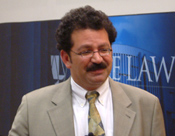Third Annual Bernstein Lecturer Chibli Mallat
Third Annual Bernstein Lecturer Examines Patterns in Emerging Constitutions
“Strong moments in constitution-making often result from traumas,” observed Professor Chibli Mallat embarking on an analysis of the constitutions-in-progress of the European Union, Iraq, and Afghanistan. Mallat, the EU Jean Monnet Professor in Law and director of the Centre for the Study of the European Union at the Université Saint-Joseph in Beirut, Lebanon, delivered the Third Annual Herbert L. Bernstein Memorial Lecture in International and Comparative Law at Duke Law School on September 28 th.

“Nothing defines trauma for Afghanis and Iraqis more than war, internal and international, for over a quarter of a century, and their most lasting response, if war is to be transcended, will be a working constitution,” Mallat told a standing-room-only audience of students, faculty, and guests. He added that the EU itself is considered a triumph of Europe over two tragic World Wars and the Cold War.
A quest for lasting peace underscores all three nascent constitutions, as Mallat made clear. Several articles of the Afghani constitution mention “crimes against humanity”–in one context, as being a justification for finding the otherwise powerful president derelict in his duties–while the Preamble to the interim Iraqi constitution states that the people of Iraq “reject violence and coercion in all their forms, and particularly when used as instruments of governance.” A similar motivation lies behind the EU’s commitment to transnational “prosperity and good neighborliness,” as well as the Iraqi constitution’s open reference to federalism, he suggested.
“In Iraq, constitutionalism is forging ahead in the most delicate of all arrangements, that is the attempt for a constitution to be inclusive of two dominant and competing national identities–Kurdish and Arab–and two dominant and competing religious sects, Shi’i and Sunni Islam.”
Citing a pattern of “constitutional internationalism,” Mallat noted that neither the Iraqi nor Afghani constitutions fit the traditional model of “sovereign texts, made by people to rule themselves by themselves.” Iraq’s 35-year history of dictatorship, violence, and international sanctions, in particular, decimated its legal culture, resulting in a constitution drafted by outsiders. The final text will be drafted by the Iraqi Parliament, scheduled to be elected in January 2005, and will then be put to a vote.
"Nothing defines trauma for Afghanis and Iraqis more than war...and their most lasting response, if war is to be transcended, will be a working constitution."
- Professor Chibli Mallat“As for the EU, even a fiction encompassing the 15 Member-States, or indeed the additional delegations from the enlarged contingent attending the Constitutional Convention, makes the effort by nature a particularly non-national one,” he said.
Addressing the issue of separation of powers, Mallat examined the constitutions individually, to determine whether the constitution is presidential or legislative, the system federal or centralized, and what voting power rests in the people.
“Constitutions are about who is to be master,” he stated bluntly. “21 st century constitutionalism does not escape the battle since the dawn of history about leadership and its democratic credentials.”
Afghanistan is emerging as a centralized presidential republic, he noted, with an extremely powerful executive elected directly by a majority (over 50 percent) of voters. The president heads the cabinet, can name some of the members of the Upper House of government and, in most cases, convene the “Loya Jirga,” the body of parliamentarians, provincial and district council heads who are charged with dealing with the “supreme interests” of the country.
“The tailoring of the constitutional text to fit a particular person is simply wrong, and the sacrifice of real checks and balances to presidential power…is ripe for trouble to come,” said Mallat.
The issue is in flux in Iraq, because of the duality of president-Prime Minister in the transitional administration, and the promise of federalism in the draft constitution. He called the protection of federalism and the unique position of women, who are to hold one quarter of the Parliamentary seats, crucial to Iraq’s success as a democracy.
Mallat was particularly critical of the “democratic deficit” in the constitution finally agreed upon in June by the European Council, a problem resulting from the placement of legislative and executive powers in a “triangle” of Council-Commission-Parliament in which only the first two institutions hold legislative power. While the Council, composed of elected heads of state is “indispensable,” Mallat called the powerful Commission devoid of popular legitimacy, composed as it is of Council appointees. It was unnecessary, he argued, and Parliament, with its elected members, should have been given “a real legislative role.”
Late in his talk Mallat returned to the “special form of internationalism” emerging as a theme in 21 st century constitutions. Just as domestic problems can “spill over” borders with negative international consequences, constitutional success can also have a wide reach, he said. “There is little doubt that success in Afghanistan and/or Iraq will raise constitutional standards to affect an immense area, reaching into India through Pakistan and Kashmir, and across the Middle East and North Africa in the case of Iraq–including Palestine-Israel.”
A webcast of Professor Mallat’s lecture can be found on our webcast page.
The Herbert L. Bernstein Memorial Lecture in International and Comparative Law honors the many contributions to Duke Law School and to the legal community made by the late Professor Bernstein, a faculty member for 17 years, and a noted specialist in contract, comparative, and private international law. “Professor Bernstein was the voice of comparative law at Duke Law School for many years,” said Dean Katharine Bartlett in her welcoming remarks.